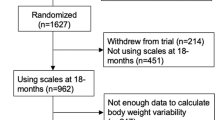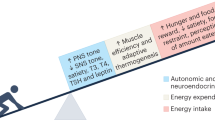Abstract
Background
Obesity treatments often do not produce long-term results. It is therefore critical to better understand biological and behavioral correlates or predictors of future weight change.
Objective
We tested the hypothesis that greater weight variability, independent of total body weight change, during early weight loss would predict degree of long-term success.
Subjects/Methods
We included 24,009 American users of the Withings smart scale with over a year’s worth of self-monitored weight data. Multilevel modeling was used to calculate weight variability as the root mean square error around participants’ weight trajectory regression line, using weekly average weights from the first 12 weeks of weight loss. Linear regressions were then used to examine whether weight variability predicted weight change from week 12 to week 48, 72, and 96.
Results
Greater weight variability predicted less weight loss/more weight regain at week 48 (b ± SE: 1.18 ± 0.17, p < 0.001), week 72 (b ± SE: 1.45 ± 0.21, p < 0.001), and week 96 (b ± SE: 1.45 ± 0.23, p < 0.001), controlling for baseline BMI and overall weight change during the first 12 weeks. An interaction effect was found between weight variability and baseline BMI such that the relationship between weight variability and later weight change was stronger in individuals with lower baseline BMI.
Conclusions
This study found that in a large population sample, weight variability early on during weight loss significantly predicted longer term weight loss outcomes. The results provide further support that weight variability be considered an important predictor of future weight change. Research is needed to understand the mechanisms underlying this effect.
This is a preview of subscription content, access via your institution
Access options
Subscribe to this journal
Receive 12 print issues and online access
$259.00 per year
only $21.58 per issue
Buy this article
- Purchase on Springer Link
- Instant access to full article PDF
Prices may be subject to local taxes which are calculated during checkout



Similar content being viewed by others
References
Anastasiou CA, Karfopoulou E, Yannakoulia M. Weight regaining: From statistics and behaviors to physiology and metabolism. Metabolism. 2015;64:1395–407.
Franz MJ, VanWormer JJ, Crain AL, Boucher JL, Histon T, Caplan W, et al. Weight-loss outcomes: a systematic review and meta-analysis of weight-loss clinical trials with a minimum 1-year follow-up. J Am Diet Assoc. 2007;107:1755–67.
Lowe MR, Feig EH, Winter SR, Stice E. Short-term variability in body weight predicts long-term weight gain. Am J Clin Nutr. 2015;102:995–9.
Montani JP, Schutz Y, Dulloo AG. Dieting and weight cycling as risk factors for cardiometabolic diseases: who is really at risk? Obes Rev. 2015;16(Suppl 1):7–18.
Lissner L, Odell PM, D’Agostino RB, Stokes J 3rd, Kreger BE, Belanger AJ, et al. Variability of body weight and health outcomes in the Framingham population. N Engl J Med. 1991;324:1839–44.
Lowe MR. Dieting: proxy or cause of future weight gain? Obes Rev. 2015;16(Suppl 1):19–24.
Winter SR, Yokum S, Stice E, Osipowicz K, Lowe MR. Elevated reward response to receipt of palatable food predicts future weight variability in healthy-weight adolescents. Am J Clin Nutr. 2017;105:781–9.
Tamakoshi K, Yatsuya H, Kondo T, Hirano T, Hori Y, Yoshida T, et al. The accuracy of long-term recall of past body weight in Japanese adult men. Int J Obes Relat Metab Disord. 2003;27:247–52.
French SA, Jeffery RW, Folsom AR, Williamson DF, Byers T. Relation of weight variability and intentionality of weight loss to disease history and health-related variables in a population-based sample of women aged 55–69 years. Am J Epidemiol. 1995;142:1306–14.
French SA, Folsom AR, Jeffery RW, Zheng W, Mink PJ, Baxter JE. Weight variability and incident disease in older women: the Iowa Women’s Health Study. Int J Obes Relat Metab Disord. 1997;21:217–23.
Lissner L, Andres R, Muller DC, Shimokata H. Body weight variability in men: metabolic rate, health and longevity. Int J Obes. 1990;14:373–83.
Feig EH, Lowe MR. Variability in Weight Change Early in Behavioral Weight Loss Treatment: Theoretical and Clinical Implications. Obesity. 2017;25:1509–15.
Lowe MR, Butryn ML, Zhang F. Evaluation of meal replacements and a home food environment intervention for long-term weight loss: a randomized controlled trial. Am J Clin Nutr. 2018;107:12–9.
Eldredge KL, Agras WS, Arnow B. The last supper: emotional determinants of pretreatment weight fluctuation in obese binge eaters. Int J Eat Disord. 1994;16:83–8.
Kroke A, Liese AD, Schulz M, Bergmann MM, Klipstein-Grobusch K, Hoffmann K, et al. Recent weight changes and weight cycling as predictors of subsequent two year weight change in a middle-aged cohort. Int J Obes Relat Metab Disord. 2002;26:403–9.
Lowe MR, Doshi SD, Katterman SN, Feig EH. Dieting and restrained eating as prospective predictors of weight gain. Front Psychol. 2013;4:577.
Stubbs J, Whybrow S, Teixeira P, Blundell J, Lawton C, Westenhoefer J, et al. Problems in identifying predictors and correlates of weight loss and maintenance: implications for weight control therapies based on behaviour change. Obes Rev. 2011;12:688–708.
Elfhag K, Rossner S. Initial weight loss is the best predictor for success in obesity treatment and sociodemographic liabilities increase risk for drop-out. Patient Educ Couns. 2010;79:361–6.
Astrup A, Rossner S. Lessons from obesity management programmes: greater initial weight loss improves long-term maintenance. Obes Rev. 2000;1:17–9.
Bangalore S, Fayyad R, Laskey R, DeMicco DA, Messerli FH, Waters DD. Body-Weight Fluctuations and Outcomes in Coronary Disease. N Engl J Med. 2017;376:1332–40.
Acknowledgements
We would like to thank the Withings company, employees and users for sharing the data with us.
Disclosure
Dr. Wilkinson is an employee of Novo Nordisk Inc.
Author information
Authors and Affiliations
Corresponding author
Ethics declarations
Conflict of interest
The authors declare that they have no conflict of interest.
Additional information
Publisher’s note Springer Nature remains neutral with regard to jurisdictional claims in published maps and institutional affiliations.
Rights and permissions
About this article
Cite this article
Benson, L., Zhang, F., Espel-Huynh, H. et al. Weight variability during self-monitored weight loss predicts future weight loss outcome. Int J Obes 44, 1360–1367 (2020). https://doi.org/10.1038/s41366-020-0534-6
Received:
Revised:
Accepted:
Published:
Issue Date:
DOI: https://doi.org/10.1038/s41366-020-0534-6
This article is cited by
-
The impact of early body-weight variability on long-term weight maintenance: exploratory results from the NoHoW weight-loss maintenance intervention
International Journal of Obesity (2021)
-
Increase in Daily Steps During the Early Phase of a Physical Activity Intervention for Type 2 Diabetes as a Predictor of Intervention Outcome
International Journal of Behavioral Medicine (2021)



